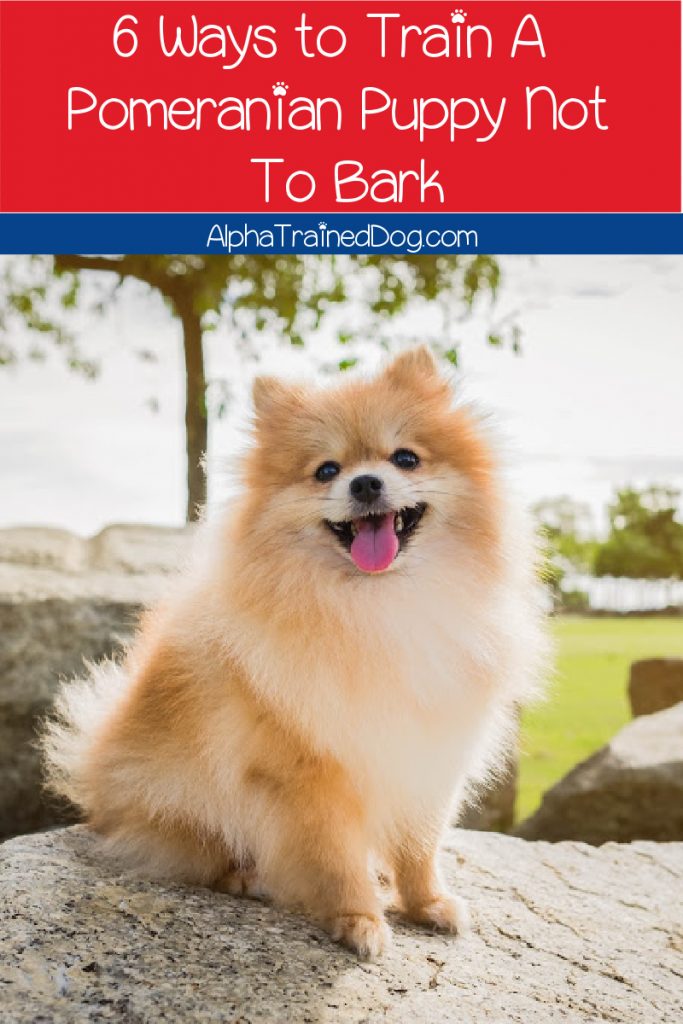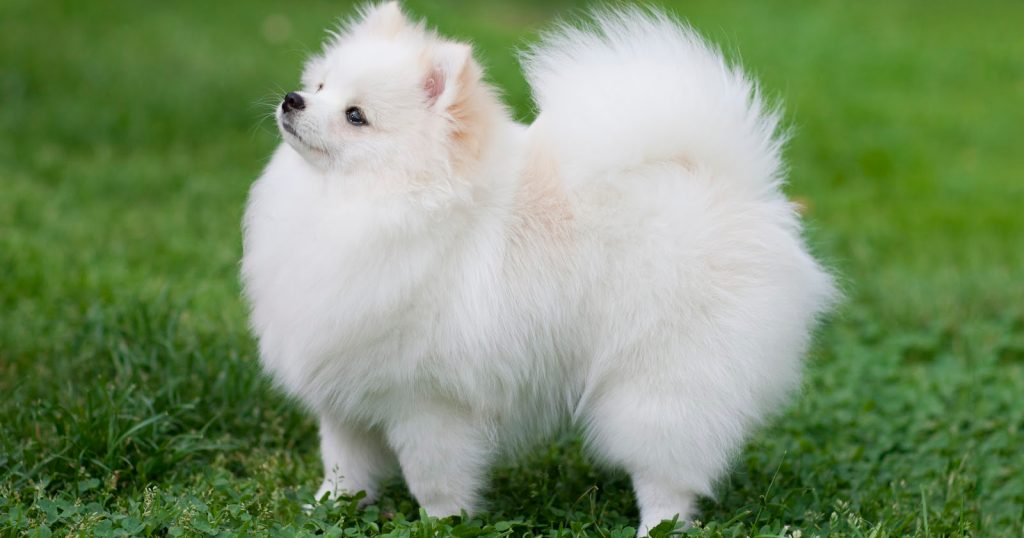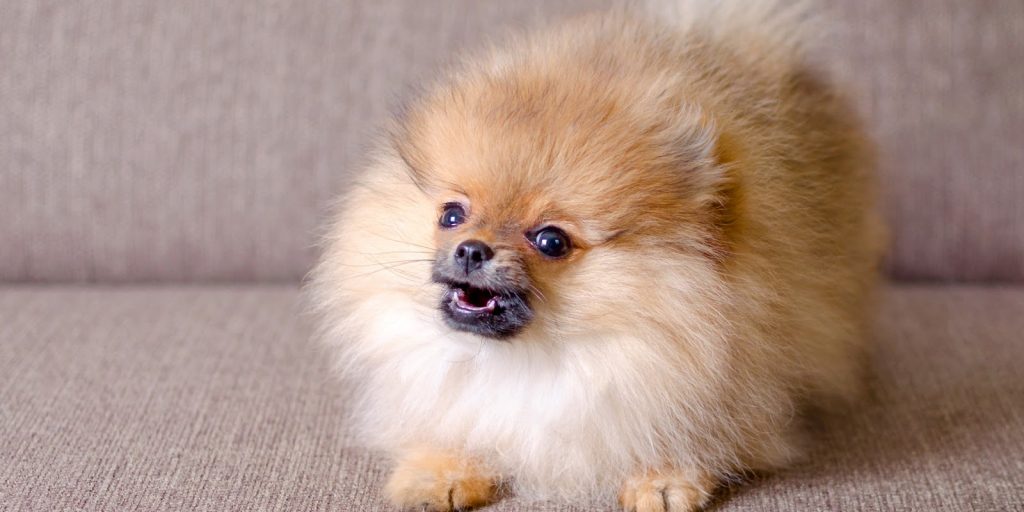Are you scratching your head how to train your Pomeranian puppy not to bark?
While small and adorable, Pomeranians can be excessive barkers and drive you crazy with their mighty howl.
Fortunately, we’ve got your back with 6 training secrets to calm a barking Pomeranian.
Just keep on reading.
Related: how to train a pomeranian puppy not to bite

How to train a Pomeranian puppy not to bark
Poms are alert of their surroundings and make excellent watchdogs due to their suspicious nature.
While that’s definitely not a bad thing, it does come with its downsides.
Unfortunately, many Pomeranians don’t know when to stop barking and can be quite vocal at times.
Before we can understand how to train a Pomeranian puppy not to bark, we of course need to understand why they do it in the first place.
So, we’ll take a look at some of their common triggers.
Then, we’ll move onto some amazing tips to stop their excessive barking.

Why Do Pomeranians Bark?
Let’s first talk about why your Pomeranian puppy is barking so much. Find what causes the barking, and you’re halfway to fixing the problem.
Usually, excessive barking is related to:
- Frustration. If there’s something outside that your Pom can’t reach, they might bark to relieve frustration. That’s called barrier frustration.
- Fear, anxiety, or stress. Whenever something is bothering your Pom, they might bark to communicate the problem to you.
- Resource guarding. Your Pomeranian might protect not only you and your house, but also their toys, beddings, and food.
- Lack of attention. Pomeranians are companion dogs and don’t like to be ignored or left alone.
- Boredom. While Pomeranians aren’t a high-energy breed, they need mental and physical stimulation or resort to barking to relieve boredom.
- Separation anxiety. If your Pomeranian barks when you leave, you might be dealing with separation anxiety, common for companion dogs.
- Lack of socialization. Without proper socialization, Pomeranians grow to be timid and anxious dogs that might bark at the slightest unusual object/sight they encounter.
If your Pomeranian doesn’t bark at all, it can be due to a medical reason or a quirk of your dog’s personality.
Sometimes Pomeranian might also bark so much that they would lose their voice.
Help! My Pomeranian Barks A Lot! What Should I do?
Barking is normal for all puppies and dogs.
It’s how they communicate with you to express their needs, warn you about potential dangers, and say how much they’ve missed you.
I’d be worried if you tell my “my Pomeranian doesn’t bark.”
However, it can be frustrating if your Pomeranian puppy is yapping all the time or barking at strangers.
So, let’s see six methods for dealing with a barking Pomeranian puppy.

1. Remove the Trigger
Once you know why your Pomeranian is barking, the easiest method to calm your Pom is to remove the trigger or avoid it whenever possible:
- Observe your Pomeranian puppy for a few days and keep notes on when and where the puppy starts barking.
- If your Pomeranian is barking at strangers passing by, put blinds on the windows or get your Pom to a different room.
- Move bird feeders or fountains away from the window to keep birds and cats away.
- Stand between your Pomeranian and their trigger or use a barrier (a tree or a car) during walks.
- Choose a different walking route or go for walks early in the morning or late in the evening.
2. Ignore the Barking
What do you do when your Pomeranian puppy barks? You go and check what’s wrong with your pet.
While you’ve got good intentions, you’re setting a precedent and encouraging your dog’s baying.
Pomeranians are smart dogs, so they quickly figure out that all they have to do to make you run to their side is bark.
The more you fuss over your Pom, the more your puppy is going to howl for your attention.
As cruel as it sounds, ignore your Pomeranian’s puppy barking and use positive reinforcement to reward silence:
- Wait until your Pomeranian puppy stops barking, even for a few seconds.
- Praise and reward with a tasty treat.
- Be persistent. Eventually, your Pom will understand that being quiet equals tasty treats and attention.
3. Interrupt and Redirect
Another way to train your Pomeranian puppy not to bark is to interrupt their barking and redirect their attention:
- When your Pom starts baying, clap your hands, or say a loud “No!” The point is to make your dog stop and look at you.
- The moment your Pomeranian puppy stops barking, praise your Pom, and give them a tasty treat. Choose something irresistible that you’ll only use for training.
- Then redirect your Pomeranian puppy’s attention to a toy, play a game, or engage in obedience training. Focus your dog’s attention on something so that they don’t go back to barking.
4. Teach Quiet
To teach your Pomeranian puppy “quiet,” you have to get them to “speak” on command:
- Use one of your Pomeranian’s barking triggers, for example, the doorbell.
- When your dog starts barking, say “Speak” and toss your pet a treat.
- Practice until your Pomeranian starts speaking when they hear the command.
Once you’ve mastered “speak,” you can move to “be quiet”:
- Say “speak” and wait for your Pom to bark.
- When they do, say “quiet” and place a treat under your dog’s nose.
- Most Poms will shut up to check what you’re holding and when they do, praise and reward.
- Keep practicing.
Here’s an interesting video to help you succeed in teaching “speak” and “quiet.”
5. Ask For Incompatible Behavior
Another method for training your Pomeranian puppy not to bark is to tell your pet to do something incompatible with barking:
- Say “Sit” or “Roll Over” when your puppy starts howling.
- To follow your command, your dog will have to stop barking.
- When that happens, reward your Pom with a treat and praise.
This method’s main disadvantage is that your Pomeranian puppy should already be familiar with the basic commands.
That could be a problem if you haven’t started obedience training yet.
6. Desensitize your Pomeranian Puppy
The last method you can try to train your Pomeranian puppy not to bark is desensitizing your dog to the trigger:
- Establish your Pomeranian’s puppy threshold – the distance between the dog and the trigger that doesn’t lead to barking.
- Take a step or two towards the trigger. Reward your Pomeranian puppy if they stay calm and don’t react.
- Step back if there’s any barking and wait for your Pom to calm down. Then try again but move more slowly.
- Repeat until your Pomeranian puppy doesn’t bark at the trigger.
As you can imagine, this method takes time because you’re trying to teach your Pom to associate their trigger with positive things, such as food.
You can watch this video to see how the method work:
Dos and Don’ts when training a Pomeranian not to bark

Besides knowing how to train your Pomeranian puppy not to bark, you should handle the barking the right way.
Otherwise, you might make the problem worse. So, here are some vital dos and don’ts.
1. Provide Physical and Mental Stimulation
Pomeranians are smart, companion dogs that get bored easily when you’re not around to keep them company.
Make sure that you have enough suitable toys to keep your Pomeranian puppy occupied and distracted.
Moreover, don’t forget to exercise your dog.
A tired Pomeranian puppy is a puppy that won’t have the energy to bark all night and will sleep through the night.
2. Socialize
The best way to curb barking in Pomeranians is to socialize your puppy.
Getting your Pom comfortable around different noises, smells, and people ensures that your dog won’t get scared by ordinary objects and sounds.
3. Involve the Whole Family
Talk to the whole family about your Pomeranian puppy barking and how you plan to deal with it.
It’s vital that everybody reacts the same way and doesn’t encourage the barking in any way.
4. Don’t Make a Big Deal of Comings/Goings
If your Pomeranian puppy barks when you leave, they probably don’t want to be alone.
Ensure that your puppy has everything they need and don’t make a big deal of leaving the house to avoid stressing your puppy.
5. Don’t Shout or Use Physical Correction
When your Pomeranian puppy has been barking for hours, you’re bound to get frustrated. However, it’s important not to shout at the puppy.
Your dog will think that you’re responding to the barking and will howl twice as hard.
Also, don’t use physical force, negative reinforcement, or anti-barking collars.
You’re only going to make your Pomeranian puppy afraid and timid.
Consider using ultrasonic anti-barking devices as a last resort.
Pomeranians might be tiny, but they can be persistent barkers, especially when you spoil them.
Set your rules while your Pomeranian puppy is still young, and don’t encourage barking with attention.
You can also think about enrolling your Pomeranian in puppy training classes so that your pet can learn manners.



Trackbacks/Pingbacks